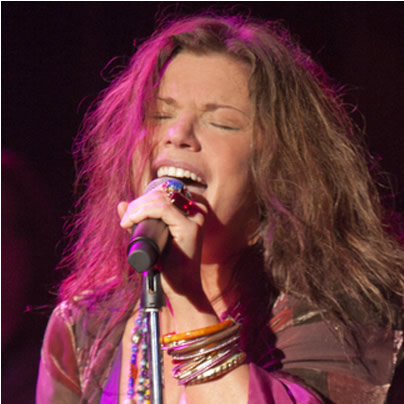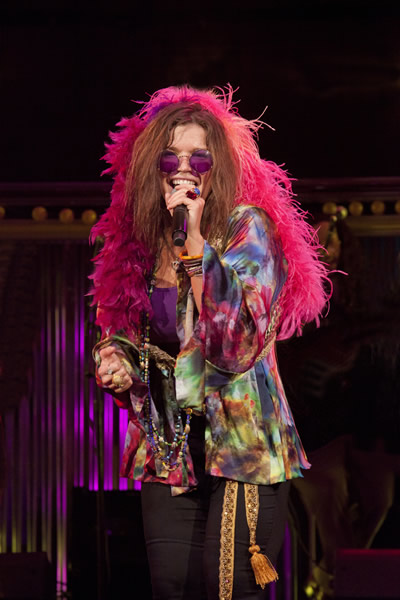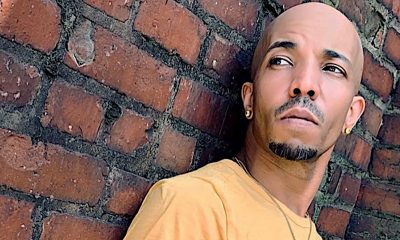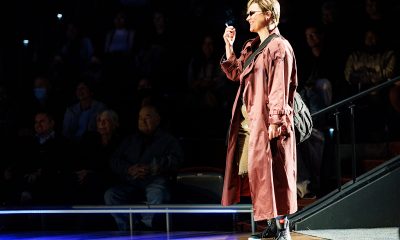Arts & Entertainment
Janis returns
Actress Davies stars again in Joplin-themed concert/theater mashup

‘One Night With Janis Joplin’
By Randy Johnson
Arena Stage
Mead Center for American Theater
Runs through Aug. 11
$40-$99 for various performances
Sundays, Tuesdays and Wednesdays at 7:30 p.m.
Thursdays, Fridays and Saturdays at 8 p.m.
Saturdays and Sundays at 2 p.m.
arenastage.org
Few music lovers — relatively speaking — had a chance to see Janis Joplin live considering she died in 1970. It’s tempting to say that “One Night With Janis Joplin,” the gay-penned (by Randy Johnson) tribute show playing now at Arena Stage, is the next best thing to the now-impossible notion of going to a Joplin performance.
And while the show is that, it’s also not just a cheesy rock tribute show of the type we see given in honor of classic rock acts all the time. It’s its own musical/theatrical experience with singer/actress Mary Bridget Davies in the title role earning raves for her uncanny ability at not just channeling but recreating Joplin’s trademark gutbucket vocals.
The show was a hit at Arena last fall when nearly 20,000 people saw it in Washington. It’s had successful engagements in Portland, Cleveland and Pasadena, Calif., and will open on Broadway at the Lyceum Theatre in October.

Mary Bridget Davies as Janis Joplin in ‘One Night With Janis Joplin.’ (Photo by Jim Cox; courtesy Arena)
Davies (34, straight and Helen Hayes Award-nominated for the role) whom we interviewed last year as well, took a few minutes with us by phone last week from her home in Cleveland to riff on everything from how the show has varied in different cities to why the Joplin allure remains undiminished decades after her untimely death. Her comments have been slightly edited for length.
WASHINGTON BLADE: How was the run at Arena versus other places you’ve played the show?
MARY BRIDGET DAVIES: Arena Stage runs like such a well-run ship. Nothing was ever a problem there. It was like summer camp for theater and we just had a really good time. I’m completely excited to come back.
BLADE: Some critics have said it seems like you were born to do this. Do you feel some cosmic destiny with Janis?
DAVIES: It’s weird, yeah, sometimes I do feel like she’s around. There are some accidental parallels too — frustrated attempts at college … she was just so free and I get to enjoy some of that. I mean, yes, I’m up there saying lines, I’m not just winging it, but she just had that wild abandon and I get to do that every night.
BLADE: Has the show changed since last fall?
DAVIES: Yes, it’s been evolving and getting tighter. We’re not like this tired old circus chorus walking in circles. We’ve had several little breaks so each time we come back excited to do it again. And I think we’ll enjoy it even more this time because the terrain is more familiar now.
BLADE: Have the crowd reactions varied much from city to city?
DAVIES: I was very, very nervous in Pasadena because it’s L.A., so anyone who was anyone came to the show. I mean, like, Cher was there one night. There was a lot of industry vibe there that gave it kind of a scary urgency. At Arena before, I would say we had the most forward people. People would try to get on the stage and dance. I kinda looked at the crew like, “Uh, what am I supposed to do here?” They would wrangle them off like in the Van Halen video. It’s kind of flattering that they were so moved they wanted to get up and jam but it does blur the lines a little. Secretly I was kinda OK with it as long as you don’t try to rip the mic out of my hand and say, “It’s my friend’s birthday.”
BLADE: Is it ever hard to find the balance between crowd interplay and performing it as a straight-up dramatic piece?
DAVIES: Yes. Like in Milwaukee we had this much smaller space with a modified thrust stage. It was almost more fun on one hand but also more intimidating too. If you had a bruise or something, they could see it, it was that close. As a performer you really shouldn’t let the crowd dictate the proceedings but there is something of that fourth wall break because this isn’t a straight-up dramatic piece or a musical. People don’t always realize that. They’ll be on their phone or act like they’re home watching TV. One dude went to sleep. I’m like, “Are you kidding me? This is really hard!” Another guy held a tablet on his lap and taped the entire show.
BLADE: I know technically that’s a no-no, but still, from a historical perspective, think how awful it would be if nobody had bootlegged any of Janis’s shows. We’d have so much less to go on. As long as somebody isn’t trying to profit off of it, isn’t there some value in stealth recording?
DAVIES: Oh yeah, in terms of my research and as a fan, I get that. The rock and roll part of me thinks that’s cool but then on the other hand with the copyright issues, you have to respect that too. You don’t want some 30-second barrage out of someone’s purse showing up on YouTube.
BLADE: As great a run as you’re having with this, is there some part of you that’s concerned about your entire persona and identity getting swallowed up by the myth of Janis?
DAVIES: I have people come up to me and say, “Aren’t you that Janis girl?” I wear it as a badge of honor. I think I’ve been able to maintain a balance. I just released my own album — which Arena has been very kind to let me sell at the shows — and I was nominated for a blues music award. And I take my down time to try to stay current within the industry. But you’re right, it can be a double-edged sword. … There may come a time when my heart’s not in it but for now I’m proud to be “the Janis girl.” If they were saying, “Hey, aren’t you the Ashley Simpson girl?” I’d be a lot more worried.
BLADE: Is part of the reason the show’s been such a hit is that people simply crave hearing Janis sing and this is as close as it gets at least for a live experience?
DAVIES: Yeah, I think there is some of that. It can be pretty overwhelming at times. People still go see Big Brother (Joplin’s old band) in droves, especially in Europe. People are crying. She died 43 years ago and people are still throwing themselves at my feet. Sometimes I’m like, “Whoah, I don’t know how to handle that.” I think people just miss her so much, they’ll take her any way they can get her. Other people come in rather skeptical but I always say, that’s fine. Go ahead and come in skeptical because then the end up leaving very happy.

Team DC, the umbrella organization for LGBTQ-friendly sports teams and leagues in the D.C. area, held its annual Night of Champions Awards Gala on Saturday, April 20 at the Hilton National Mall. The organization gave out scholarships to area LGBTQ student athletes as well as awards to the Different Drummers, Kelly Laczko of Duplex Diner, Stacy Smith of the Edmund Burke School, Bryan Frank of Triout, JC Adams of DCG Basketball and the DC Gay Flag Football League.
(Washington Blade photos by Michael Key)




















The 2024 National Cannabis Festival was held at the Fields at RFK Stadium on April 19-20.
(Washington Blade photos by Michael Key)
















Covering the @NatlCannaFest at RFK Stadium for @WashBlade . Stop by the LGBTQ+ booth and pick up a paper if you are here. pic.twitter.com/is7hnsaPns
— Michael Patrick Key (@MichaelKeyWB) April 20, 2024
Theater
‘Amm(i)gone’ explores family, queerness, and faith
A ‘fully autobiographical’ work from out artist Adil Mansoor

‘Amm(i)gone’
Thorough May 12
Woolly Mammoth Theatre
641 D St., N.W.
$60-$70
Woollymammoth.net
“Fully and utterly autobiographical.” That’s how Adil Mansoor describes “Amm(i)gone,” his one-man work currently playing at Woolly Mammoth Theatre.
Both created and performed by out artist Mansoor, it’s his story about inviting his Pakistani mother to translate Sophocles’s Greek tragedy “Antigone” into Urdu. Throughout the journey, there’s an exploration of family, queerness, and faith,as well as references to teachings from the Quran, and audio conversations with his Muslim mother.
Mansoor, 38, grew up in the suburbs of Chicago and is now based in Pittsburgh where he’s a busy theater maker. He’s also the founding member of Pittsburgh’s Hatch Arts Collective and the former artistic director of Dreams of Hope, an LGBTQ youth arts organization.
WASHINGTON BLADE: What spurred you to create “Amm(i)gone”?
ADIL MANSOOR: I was reading a translation of “Antigone” a few years back and found myself emotionally overwhelmed. A Theban princess buries her brother knowing it will cost her, her own life. It’s about a person for whom all aspirations are in the afterlife. And what does that do to the living when all of your hopes and dreams have to be reserved for the afterlife?
I found grant funding to pay my mom to do the translation. I wanted to engage in learning. I wanted to share theater but especially this ancient tragedy. My mother appreciated the characters were struggling between loving one another and their beliefs.
BLADE: Are you more director than actor?
MANSOOR: I’m primarily a director with an MFA in directing from Carnegie Mellon. I wrote, directed, and performed in this show, and had been working on it for four years. I’ve done different versions including Zoom. Woolly’s is a new production with the same team who’ve been involved since the beginning.
I love solo performance. I’ve produced and now teach solo performance and believe in its power. And I definitely lean toward “performance” and I haven’t “acted” since I was in college. I feel good on stage. I was a tour guide and do a lot of public speaking. I enjoy the attention.
BLADE: Describe your mom.
MANSOOR: My mom is a wonderfully devout Muslim, single mother, social worker who discovered my queerness on Google. And she prays for me.
She and I are similar, the way we look at things, the way we laugh. But different too. And those are among the questions I ask in this show. Our relationship is both beautiful and complicated.
BLADE: So, you weren’t exactly hiding your sexuality?
MANSOOR: In my mid-20s, I took time to talk with friends about our being queer with relation to our careers. My sexuality is essential to the work. As the artistic director at Dreams of Hope, part of the work was to model what it means to be public. If I’m in a room with queer and trans teenagers, part of what I’m doing is modeling queer adulthood. The way they see me in the world is part of what I’m putting out there. And I want that to be expansive and full.
So much of my work involves fundraising and being a face in schools. Being out is about making safe space for queer young folks.
BLADE: Have you encountered much Islamophobia?
MANSOOR: When 9/11 happened, I was a sophomore in high school, so yes. I faced a lot then and now. I’ve been egged on the street in the last four months. I see it in the classroom. It shows up in all sorts of ways.
BLADE: What prompted you to lead your creative life in Pittsburgh?
MANSOOR: I’ve been here for 14 years. I breathe with ease in Pittsburgh. The hills and the valleys and the rust of the city do something to me. It’s beautiful, it’ affordable, and there is support for local artists. There’s a lot of opportunity.
Still, the plan was to move to New York in September of 2020 but that was cancelled. Then the pandemic showed me that I could live in Pittsburgh and still have a nationally viable career.
BLADE: What are you trying to achieve with “Amm(i)gone”?
MANSOOR: What I’m sharing in the show is so very specific but I hear people from other backgrounds say I totally see my mom in that. My partner is Catholic and we share so much in relation to this.
I hope the work is embracing the fullness of queerness and how means so many things. And I hope the show makes audiences want to call their parents or squeeze their partners.
-

 District of Columbia5 days ago
District of Columbia5 days agoNew D.C. LGBTQ+ bar Crush set to open April 19
-

 District of Columbia5 days ago
District of Columbia5 days agoReenactment of first gay rights picket at White House draws interest of tourists
-

 Arizona5 days ago
Arizona5 days agoAriz. governor vetoes anti-transgender, Ten Commandments bill
-

 South America3 days ago
South America3 days agoDaniel Zamudio murderer’s parole request denied












